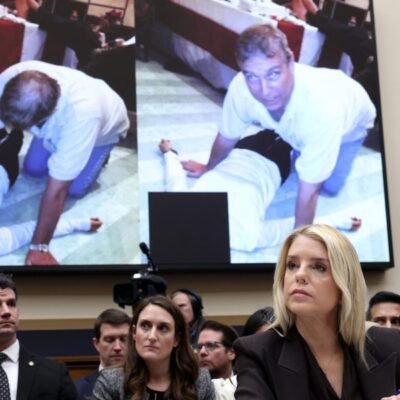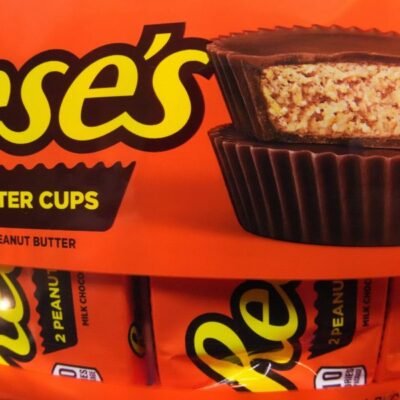For the Prince of Wales, it is a diplomatic mission that could not be more timely.
As the heir to the throne landed in Estonia on Thursday afternoon, he embarked on a short, but “crucial” visit where he will reiterate his unwavering support for Ukraine.
The Prince touched down in Tallinn shortly after 2pm local time (12pm GMT) and was driven straight to the presidential office.
After being greeted by Alar Karis, the Estonian president, he briefly chatted to a group of flag-waving young children from the local Tallinn Lotte Kindergarten.
They presented him with a cuddly dog called Lotte, which is also the name of one of Estonia’s most famous children’s characters, for his children, Prince George, Princess Charlotte and Prince Louis.
Mr Karis showed the Prince his garden before leading him upstairs to sign the guestbook, joking that he hoped the pen would work.
As they sat down in the 100-year-old building’s blue cabinet room, the president spoke to the Prince about Estonia’s history, saying “We did fight for our independence,” and mentioning his country’s troops’ actions in Afghanistan.
He also thanked the Prince for the UK’s military presence at Tapa Camp, the army base just 80 miles from the Russian border.
“With British troops at Tapa, we really, we really appreciate it,” he said.
He added: “This morning the defence minister said he’d probably send some troops to Ukraine. Hopefully some of these troops will stay also.”

Estonian president Alar Karis thanked the Prince for the presence of Britain’s troops in his country – Valda Kalnina/EPA-EFE/Shutterstock
The two-day solo visit has been about six months in the making but comes at a particularly sensitive time as the UK and its European allies seek to bolster defences in Ukraine ahead of a possible ceasefire deal.
As such, it is one of the Prince’s most high-profile and politically engaged foreign visits of recent years as he continues to build his presence on the global stage.
A Kensington Palace source said it would act as a “further demonstration of the support that both the Prince and the Princess of Wales have given to the Ukrainian people since the start of the conflict” with the Prince “representing the UK at the highest level as Prince of Wales”.
Prince William’s visit will also highlight the leading role of British troops stationed at the front line of Nato’s defence against Russia, and he will join them in a field exercise at Tapa Camp.
The visit is also considered a crucial and timely opportunity to reassure Estonians of the UK’s commitment to their security.
The two nations are “highly like-minded” when it comes to Russia and the Prince’s visit follows that of Sir Keir Starmer, the Prime Minister, and John Healey, the Defence Secretary, shortly before Christmas, when they reiterated the strength of that relationship.

Sir Keir Starmer visited the Tapa Camp army base close to the Russian border in December – Stefan Rousseau/PA
On his last full overseas visit, to South Africa last November, Prince William sat down for talks with Cyril Ramaphosa, the country’s president. The following month, he was on hand to greet the Emir of Qatar, Sheikh Tamim bin Hamad Al Thani, during an incoming state visit and was showered with praise by Donald Trump after being scrambled at late notice for a tête-à-tête with the US president in Paris.
While the genesis of the trip was for the Prince to meet the troops stationed in Estonia as part of Operation Cabrit, a palace source said that it was important for him, on any trip, to build relationships with his counterparts and to play his part in strengthening diplomatic ties.
“The Prince is extremely keen to support his father when needed and support the British Government,” the source said.
The Prince will also visit the Freedom School, which was founded in May 2022 to help some of the 60,000 Ukrainian refugees now living in Estonia continue their education after Russia’s full-scale invasion of their country.
He will speak to teachers and pupils, as well as a school psychologist, about the ongoing impact of the war before joining children for a spot of basketball and dropping in on a Ukrainian language lesson.
Estonia currently plays host to around 900 soldiers from the British Army who are leading a battle group alongside French allies.

The visit to Estonia is one of the Prince’s most important overseas trips yet – Raigo Pajula/AFP via Getty
The links between the Crown and the military are said to be “extremely close to the Prince’s heart”, having served with the Army for seven-and-a-half years,
The visit is considered a natural step on from his trip to Poland in March 2023, which was described as a “personal mission” to praise British troops working near the Ukraine border for “defending our freedoms”.
The Prince was made Colonel-in-Chief of the Mercian Regiment in August 2023, taking over from his father, the King.
On Friday, he will don Army fatigues and the regiment’s traditional green beret to take part in a handover ceremony as its soldiers begin a six-month deployment at the Tapa Camp. The Prince will learn about their various weapon systems as well as the mental health support available to soldiers on the base.
For the small eastern European nation, memories of Soviet occupation remain strong, and with almost every family having suffered in some way, Russia’s aggression towards Ukraine is said to be horribly familiar.
The UK’s military presence is particularly valued given fears that following a potential peace deal between Russia and Ukraine, Russia could re-arm rapidly and threaten Ukraine again, or even attack Estonia and other nearby Nato allies.
The Prince’s visit comes weeks after the Baltic states officially severed the flow of electricity from Russia and joined the European grid – a symbolic as well as a practical step.
As such, he will join a workshop with a range of renewable energy start-ups to learn how, in the wake of that decision, clean technology can play a role in the transition.
Estonia has the most “unicorns” – start-ups growing to be worth more than $1 billion (£760 billion) – per head in the world and the nation is proud of its burgeoning tech sector, a fact that will not be lost on the Prince in his ongoing quest for nominations for his Earthshot Prize.





